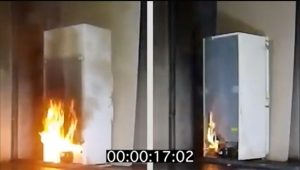Updated on March 13, 2023
Can a Mini Fridge Catch Fire
A refrigerator is a popular and necessary piece of kitchen and home equipment. Many people consider buying a fridge to be their first major purchase for the home. A refrigerator, like a microwave oven and a stove, is often left on all the time, increasing the danger of an accident.
There are several methods and causes for which a refrigerator might catch fire. Faulty electrical components, a shorted relay switch, a lit lamp inside the fridge while the door is closed, and plastic parts that might serve as a fuel source are the most common causes.

The combination of these variables, as well as other adverse events, might lead to an explosion or the discharge of poisonous gases in a refrigerator fire. Refrigerator fires may be avoided by being aware of and avoiding the potential ignition sources and spread mechanisms. The rest of this page will explain the causes, features, and effects of a refrigerator catching fire.
The potential of an electrical fire is inherent in all electrical equipment, and small fridges have been known to go on fire. Using extension cables or adaptors to connect your refrigerator to an electrical outlet might increase the danger of a fire.
What Safety Tips Should I Use for My Compact Refrigerator?
Your first concern is probably not the safety of your home when you decide to install a tiny fridge in your bedroom. It’s crucial to have snacks on hand, but it’s definitely best to put safety first. Refrigerators do sometimes catch fire and explode, but this is a rare event. They may also topple over, which is why you should use them with caution.
Reduce the Risk of Fire
The potential of an electrical fire is inherent in all electrical equipment, and small fridges have been known to go on fire. Using extension cables or adaptors to connect your refrigerator to an electrical outlet might increase the danger of a fire. Use the grounding prong provided with your refrigerator if it has one. Make sure you don’t cut or modify the plug.
Make sure the coils and vents are well-ventilated to prevent your refrigerator from overheating. Vacuum the area behind and beneath your refrigerator on a regular basis to prevent dust from accumulating and clogging the vents and fans. You don’t want to receive a shock from the refrigerator while vacuuming. It’s also a fire danger to pile up papers and other junk around your tiny fridge, so keep that in mind. A dirty refrigerator that restricts airflow is not only unsafe, but it also increases the amount of power the appliance consumes, making it more efficient.
A Proper Mini Fridge Stand
Your fridge has to be placed on a firm, stable foundation so that it doesn’t fall on top of you. Even while a compact fridge fall is less dangerous than a full-sized refrigerator, it may still cause serious injury. A falling fridge may hurt pets and young children.
Your fridge may be placed on the floor if it feels stable, but only if you are sure that it will not fall over. Instead of a firm surface such as linoleum or hardwood, use a small fridge stand to lift the unit off the floor. Consider the weight of your fridge and the size of the stand you’ll be using before making a purchase. When using a stand or table, be sure not to leave the refrigerator dangling over one side.
Set up anti-tip brackets or straps if you’re going to place the small fridge in an area where it’s difficult to maintain the appliance level and secure.
Mini-Refrigerator Food Safety
To make safe use of your small fridge, you must pay equal attention to the interior and exterior of the unit. Maintain an interior temperature of 40 degrees Fahrenheit or lower as the seasons change using the temperature control on your tiny fridge. It has been shown that bacteria that might cause foodborne sickness thrive at warmer temperatures, according to the Academy of Nutrition and Dietetics (AND).
Additionally, the Academy advises that you clean up any spills as soon as possible, as well as not overfilling your fridge. Your food will be safe to eat if the fridge is properly ventilated.
What can cause a fridge to catch fire?
Damaged wiring and wire insulation, as well as an electrical component known as a “capacitor,” are the usual causes of many fires that tragically result in the loss of life and property. The compressor’s electrical supply is stabilised by this mechanism, which stores electrical energy in electrical devices and smooths out any supply imbalances.
A capacitor is often exposed to a variety of stresses during the course of its useful life. These include over-voltages, over-heating, pollution, humidity, and radiation, which may cause it to deteriorate and eventually break down.
A malfunctioning capacitor, particularly in an ancient refrigerator, might start a fire owing to internal shorting, which is often linked to both an electrical and mechanical problem. A spectacular and powerful igniting or pressured eruption will happen as a consequence. However, there are a number of mechanical and electrical components that might lead to a fire. Let’s have a look at this in more detail:
Conclusion
A refrigerator may catch on fire, as has been mentioned. In most cases, however, this is due to a combination of causes including subpar upkeep and cleaning as well as faulty wiring, electrical surges, overloading, carelessness or human mistake.
In spite of the seriousness of these fires and the fact that flammable plastics and insulating material might operate as an ignition source, the best mitigation is to take precautionary measures. You should be able to avoid a fridge fire if you carefully follow the advice shown above.

